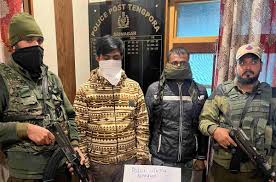
How India Manipulates the Drug Narrative in Kashmir
Tanveer Baba
On November 13, two foreigners, Vipin Kumar and Love Kumar, were arrested in Srinagar’s Tengpora Bypass area with significant quantities of heroin and brown sugar. Days later, another pair—Surinder Pal Saini from Punjab and an unidentified associate—were apprehended in the 90 Feet area of the city, similarly in possession of substantial amounts of narcotics. These arrests, however, failed to make headlines in the way the Indian military administration typically orchestrates narratives involving drugs in Kashmir. The official rhetoric has long painted Pakistan as the origin point for drugs in Kashmir, alleging that the revenues generated from their sale fund armed resistance movement in the region. Now, the arrest of these Indian nationals casts a glaring shadow of doubt on such claims and raise critical questions about who truly drives the drug trade in the region and, more importantly, who benefits from it.
Kashmir, a region already suffocating under the weight of militarization, is now grappling with the specter of a burgeoning drug crisis. But unlike the Indian administration’s assertions of an external source, the reality on the ground suggests a more insidious, internally driven campaign. The arrested individuals are not shadowy figures from across the border but Indian nationals, some from Punjab—another state devastated by drug abuse. Their involvement hints at a larger, well-oiled machinery that operates with a specific agenda to destabilize Kashmiri society by targeting its youth. Drugs, in this case, are not just commodities but tools of suppression, wielded to crush any semblance of resistance against Indian rule.
This strategy is eerily reminiscent of India’s playbook in Punjab during the 1980s and 1990s. Faced with a growing separatist movement, the Indian state flooded Punjab with narcotics and weakened communities and diffused dissent. Today, Punjab is known as the drug capital of India, with countless lives lost to addiction. Could Kashmir be treading the same tragic path?
India’s use of drugs as a weapon of control in Kashmir and Punjab is not without precedent. History is filled with examples of colonizers employing similar tactics to subdue resistance and enforce subjugation.
We have read about the British Opium Wars of the 19th century. The British Empire flooded China with opium and created a crisis of addiction that hollowed out Chinese society and stifled its ability to resist colonial exploitation. In Algeria, during the French colonization, alcohol and narcotics were systematically introduced to erode the moral fabric of resistance movement. Closer to home, during India’s colonial period, the British fostered the cultivation and trade of opium in Bengal and left behind a legacy of addiction and social decay.
These historical parallels offer chilling insights into India’s current policies in Kashmir. By engineering a drug crisis, the state seeks to dismantle the region’s socio-political cohesion, make the inhabitants of this occupied territory morally bankrupt and render its people incapacitated and less capable of organized resistance.
The muted response to the arrest of these Indian nationals in Srinagar is telling. Had the suspects been of Pakistani origin, the news would have dominated headlines, bolstered by hyper-nationalistic media coverage and claims of “narco-terrorism.” But when the trail leads back to India, silence prevails. This exposes the Indian administration’s hypocrisy. The narrative of Pakistani-origin drugs funding what they call as “militancy” is a convenient smokescreen, designed to deflect attention from internal complicity and paint Kashmiris as complicit in their own suffering.
For Kashmiris, the cost of this deception is immeasurable. Generations are being lost to addiction, families torn apart, and communities fractured. Young people, who should be the torchbearers of progress and change, are instead trapped in the quicksand of substance abuse. The international community, too, bears a moral responsibility. For too long, the world has turned a blind eye to India’s colonial-style tactics in Kashmir. As the drug crisis deepens, it is important for global powers and human rights organizations to demand accountability and investigate the state’s role in fostering this epidemic.
To the youth of Kashmir, we remind you that you are the torchbearers of a struggle that countless young souls have nurtured with their lives, their dreams, and their sacrifices. This land is soaked in the blood of martyrs who envisioned a future of dignity and freedom for you, their brothers and sisters. To see you fall prey to the scourge of drugs is not just disheartening—it is a betrayal of their sacrifice, a surrender to the very forces that seek to crush your spirit. You are not mere individuals; you are the custodians of a centuries-old legacy and a nation’s hope. How can you let their sacrifices go in vain? To our esteemed religious scholars, if you cannot directly speak against the oppressor, then at least raise your voice against this epidemic that is eating away at the soul of our community. Run awareness campaigns, educate families, and remind our youth of their duty—not just to themselves but to this land, this nation, and the countless lives that depend on their strength and resilience.



